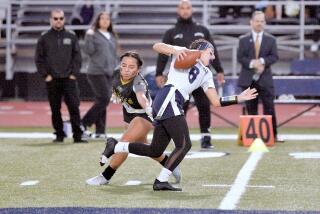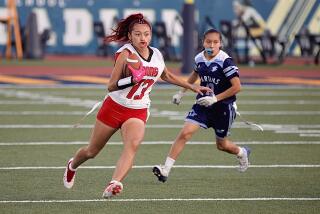High School Game Didn’t Have a Score, but Everyone Lost
High school football has usually represented America at its most appealing, offering much of what is wholesome and decent and innocent in a sometimes violently competitive world.
There is something about high school football that is both terribly old-fashioned and totally hip. The costumes never change much, on the field or on the sideline, and the cheers remain wonderfully corny, and the marching bands still blast forth a brassy version of the theme from some recent hit movie. It’s all part of the game’s charm.
There are built-in physical dangers and pressures that later make some people--adults, usually--wonder if playing high school football was worth all the trouble.
But at the risk of becoming somewhat Bob Greene-like here, the traditional weekend game is also a real slice of Americana, providing a good life lesson for those who play and a social gathering place for those who don’t, a place students probably will remember fondly when they become old and start coming back for class reunions.
Too bad there are exceptions.
Maybe you have heard about what happened at a football game last Friday night between a couple of Southern California high schools, Palmdale and Saugus--something that has embarrassed people at both places, as well it should.
Or maybe you haven’t heard. It hasn’t gotten as much nationwide attention as that “Mississippi Burning” scenario at two high schools in the deep South, where the headmaster of an all-white school reportedly considered forfeiting a football game to a team that had one black player, rather than permit this unpleasant form of integration to occur.
If this is true, this educator clearly is destined to move on to bigger and better things in life--in South Africa. There, he might be appreciated. Here, he is an anachronism. They ought to still have three washrooms in Mississippi--one marked Men, one marked Women and one marked with this guy’s name.
Fortunately, students at the segregated white school strongly objected, and several players quit the team in protest. Now it appears that the game will be played as scheduled, exactly the way football was meant to be played--with light and dark people and a brown ball.
As for Palmdale and Saugus, a happy ending might be somewhat more difficult to achieve.
But since it is never too late to, well, with a nod to Spike Lee, do the right thing, we have high hopes that all will end well. Officials of these schools’ athletic conference, the Golden League, are supposed to meet today to discuss what happened and what, if anything, should be done about it. We presume common sense will prevail.
Some background:
During the fourth quarter of a game played at College of the Canyons, Palmdale and Saugus were tied, 0-0. Neither team had a particularly outstanding record, and no championship was directly at stake. Nevertheless, the two cities are neighbors, north of Los Angeles, both with populations in the mid-teens, and the high schools are rivals, usually in the best sense of the word.
Anyway, as tensions in the game mounted and as taunts--some good-natured, some apparently not--were passed back and forth in the stands, three consecutive penalties were called against Palmdale, one for a late hit by a player and two more for unsportsmanlike conduct from the bench.
With a loss of temper that startled everyone present, 18-year-old Darius Wilson, a senior who plays both offense and defense for Palmdale, suddenly made a lunge for one of the game’s officials, back judge Bradley Woolley, 31, and, according to eyewitnesses, hurled him to the ground.
“I had my back turned and I heard him say, ‘I’m going to kill you! I’m going to kill you!’ ” Woolley said. “The next thing I knew, I had my head on the ground, and he was punching me.”
It was ugly and it got uglier. Another Palmdale player allegedly hit another official. Wilson was arrested on suspicion of misdemeanor battery. The game was suspended, with no winner, for the time being, yet declared.
“I’m not interested in a letting-bygones-be-bygones tie,” said Saugus Coach Dick Flaherty, who wanted his team awarded a victory by forfeiture.
Were that the extent of the problem, perhaps we could pass this off as just one of those things, and either determine a winner or resume play for the remaining 7 minutes 40 seconds. The player would receive punishment, in school and/or in court, and that would be that.
But there is more to thrash out. Palmdale’s principal, Linda Janzen, said players told her and also told their coaches that they had been taunted throughout the evening with racial slurs, that “players had been called racist names.”
Saugus’ coach, Flaherty, and its principal, Mike von Buelow, said they had been told no such thing. Emotions had been running high all evening, and even the coaches from both sides have been accused of adding to the tensions. California high school officials have been interviewing involved parties and watching films, trying to figure out what got the situation so hot.
This being nearly 1990, turning hard toward the 21st Century, we keep waiting to get beyond these types of early-America horror stories. One place we thought to be a safe refuge, free from this kind of thing, was high school football. We are depressed at the thought that we might have been mistaken.
More to Read
Get our high school sports newsletter
Prep Rally is devoted to the SoCal high school sports experience, bringing you scores, stories and a behind-the-scenes look at what makes prep sports so popular.
You may occasionally receive promotional content from the Los Angeles Times.






